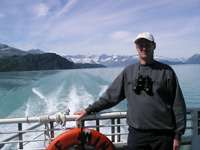Researcher investigates the origins of travel writing

(PhysOrg.com) -- Travel writing has become one of the most popular genres in recent years with bookshops dedicating sizeable sections to keep up with a growing demand from travelling readers. But how did the genre begin and what was it that compelled the pioneers of this now popular genre to record their experiences? Who read their accounts and what impact did these accounts make on readers from different social backgrounds?
A professor at the University of the West of England has just embarked on a new project to trace the writings of the trailblazing explorers of the Romantic period in literature with a particular interest in the writings of those who opened up the continent of North America and who tried to discover the fabled Northwest Passage between Europe and Asia.
Professor Robin Jarvis explains, “After the War of Independence, which ended in 1783, there was a frantic age of exploration geared to expanding territory, trade and settlement - both of the United States and of what remained of British North America. Some of these explorers took time to record their experiences but the very nature of publishing as well as the state of society at the time meant that those experiences were received in quite different ways.
“Looking at the luxurious first editions brings home to you that these books would have been affordable only by the moneyed elite, but magazines published long reviews that had a much wider circulation, and there are sources that give us insight into what people who would never get the chance to travel might think about these expeditions.
“The explorers I'm interested in have become very obscure now. They include the likes of Alexander Mackenzie who was the first person to cross the North American continent. Unlike travellers today, Mackenzie would not have had access to a transport infrastructure and traversed the vast distance on foot and by canoe.
There were also a number of expeditions after 1815 to find a viable route through the Arctic from East to West. Sir John Franklin is one of the most famous, his first overland trip ending in disaster with his expedition team marooned in the wilderness. There are fascinating accounts of the team having to eat their own shoes to survive and suspicions of murder and cannibalism.
“I'm also interested in how these pioneers related to indigenous people and the relationship between their travelling and the politics of the colonial and postcolonial eras. One writer, Samuel Hearne, who completed a very successful trip from Hudson Bay to the Arctic coast by working closely with native guides and interpreters, is unusual for the era and could be seen as a forerunner of the expeditions that are carried out in remote parts of the world today.”
The project will focus on the impact these travels made on British audiences but Professor Jarvis acknowledges that source material will not always be easy to find. “I will spend significant time poring over diaries, letters and autobiographies that might give an insight into the responses of individual readers at the time these travel narratives were first published.
“Intelligence so far indicates that the elite readers' response centred largely on scientific curiosity and new insights into the geography and natural history of a region. There was a real hunger for knowledge of foreign places in this period, and unlike today's multimedia world it was only books that could provide people with that knowledge. The reaction of working class readers points to a response of escapism and a desire to be lifted out of the drudgery of ordinary life.”
Professor Robin Jarvis is a travel writing enthusiast with a particular interest in the writings of the Romantic era. He has published widely and is an expert on the writings of Wordsworth.
The work resulting from Robin's project will be published by Ashgate in spring 2011. The research has been funded by the Arts and Humanities Research Council.
Provided by UWE
















